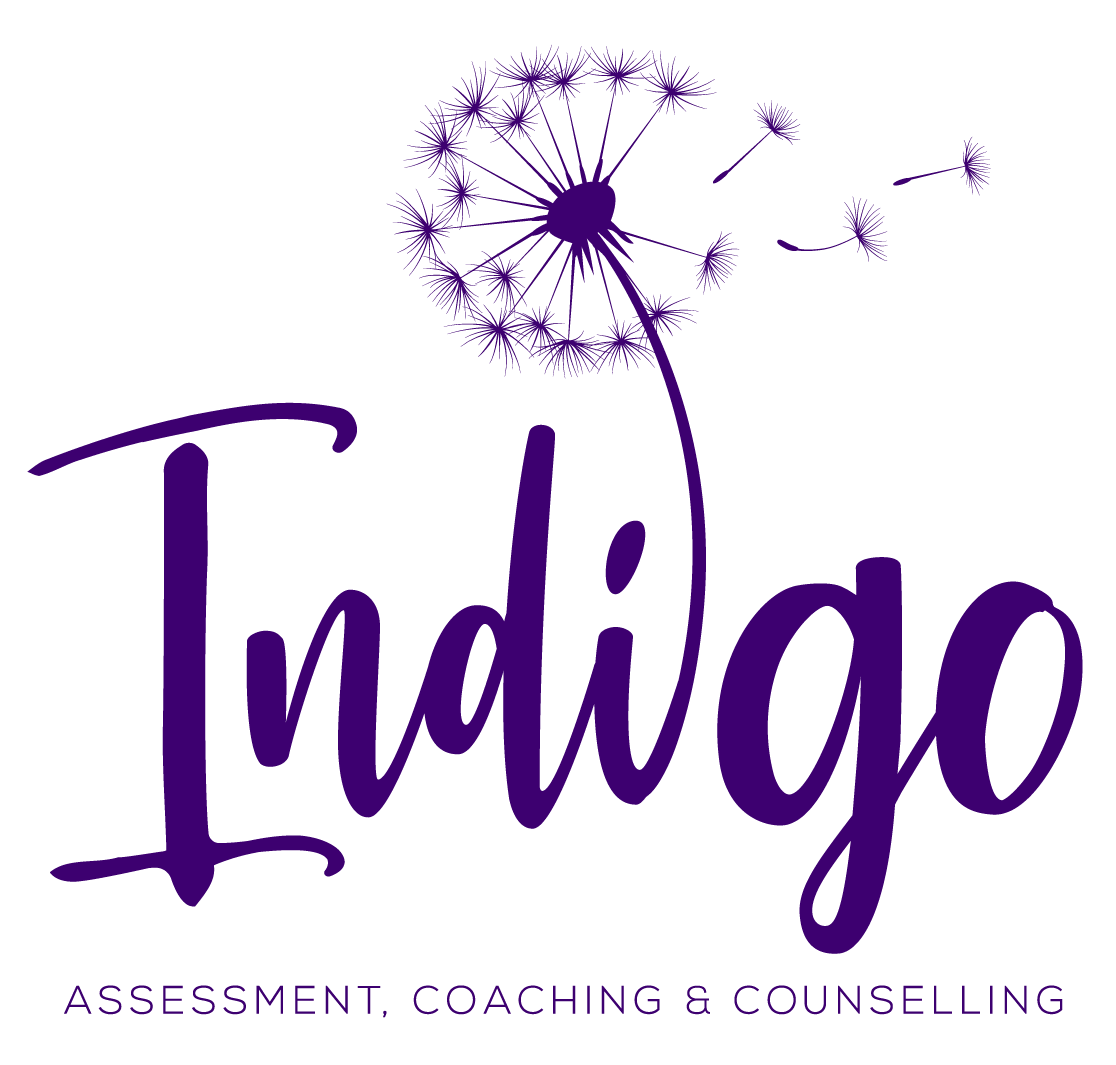
Assessment process
and
possible diagnoses
Assessment process
Understanding your concerns and gathering background information
At Indigo we are committed to making sure clients get what they need in order to better understand their child’s learning and/or behaviour and plan for the future. To do this, we need to understand your concerns as well as the journey that got you to this point. The more information you can provide, the better we’ll be able to help. You will be asked to complete detailed client history forms, and some of the information provided will be further discussed / explored in person.

Psychometric assessment and data analysis
Indigo utilises reliable and valid standardised tests, such as the Wechsler Intelligence and Achievement Scales. Various behaviour rating scales may also be used such as Conners, Social Responsiveness Scale, Piers Harris, and others. Assessments are individually selected, based on specific concerns of the individual, to provide insight into how the individual is functioning.

Reporting
You will leave the assessment with initial verbal feedback, given at the end of the assessment.
Within the next 3-4 weeks you will be provided with a written report, containing information to support understanding of the individual’s needs and recommendations for what could be done to make things better for the individual, parents/caregivers and educators.

Follow-up meeting
A follow-up meeting to discuss the assessment report, recommendations and how they may be implemented is highly recommended. This meeting can be held face-to-fact, by telephone or video conference (additional charges will apply).
Possible diagnoses
It is important to keep in mind that high rates of co-morbidity can be evident, i.e., various diagnoses can coexist.
Dyslexia
Refers to a learning difficulty that primarily affects the skills involved in accurate and fluent word reading and spelling.
Can be diagnosed through a comprehensive cognitive and educational assessment.
Gifted
Individuals are considered gifted when their ability is significantly above the norm for their age. Asynchronistic development and overexcitabilities are known characteristics that can make gifted individuals stand out from their peers, and not always in a positive way.
They can find traditional classroom learning too easy and boring. They can experience emotional and social difficulties.
A cognitive and educational assessment can identify areas and degree of advanced development.
Twice/Multi-Exceptional
Twice-Exceptional or Multi-Exceptional Learners are gifted learners whose performance is impaired, or their high potential is masked, by one or more specific learning disabilities, physical impairments, disorders or conditions.
A cognitive and educational assessment can identify areas of strength and unpack specific needs.
Dyscalculia
Refers to a wide range of learning difficulties involving mathematics. There is no single type of maths disability and it varies from person to person. Children can exhibit visual spatial difficulties or language process difficulties making it difficult to understand ‘word problems’.
Can be diagnosed through a comprehensive cognitive and educational assessment.
ADHD
ADHD is a regulatory problem of attention, activity level and impulse control and it can have a significant impact on a student’s ability to learn.
Three types can be distinguished:
Inattentive Type (previously known as ADD)
Hyperactive/Impulsive Type
Combined Type
Typically diagnosed by a medical professional (e.g. paediatrician or psychiatrist)
A cognitive, educational and behavioural assessment can identify traits and clarify specific areas of impact.
Autism
Autism (ASD) / High Functioning Autism (previously referred to as Asperger Syndrome).
Although every person with autism is unique, the following characteristics are particularly significant in the diagnosis of autism: communication, social interaction, learning difficulties, unusual/repetitive behaviour(s). Other characteristics can include unusual patterns of attention, unusual responses to sensory stimuli, and increased anxiety.
High functioning individuals usually have difficulties with social interaction, social communication and social imagination. They are distinct from those on the lower end of the autism spectrum in that they do not have similar language delays. In spite of having seemingly good language skills, they often struggle with more abstract use of language (e.g. figures of speech or inference).
Typically diagnosed by a medical professional (e.g. paediatrician or psychiatrist).
A cognitive, educational and behavioural assessment can identify traits and clarify specific areas of impact.
Dysgraphia
Refers to writing difficulties, including handwriting that is either illegible or difficult to read, as well as difficulty with spelling, and developing and structuring ideas.
Can be diagnosed through a comprehensive cognitive and educational assessment.
Dyspraxia
Also known as developmental coordination disorder. Learners with this disorder have problems adequately registering, interpreting, organising or integrating information, and it affects basic and fine motor skills.
Typically diagnosed by a medical professional (e.g. paediatrician or occupational therapist).
A cognitive and educational assessment can identify difficulties in this regard and inform whether a diagnosis is likely and/or to be pursued.
Auditory Processing Disorder
Individuals with Auditory Processing Disorder (APD) experience issues with the way their brain uses and interprets sound. It can affect their ability to focus, understand or recall information.
Diagnosed by an audiologist.
A cognitive and educational assessment can identify traits and clarify specific areas of impact.
